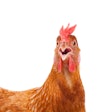I found myself involved in a discussion this week where it was argued that consumers did not really know what they wanted. While they might espouse free-range and other ideals, when it came to parting with their hard-earned cash, price was the single most important factor.
I am never quite sure who dictates what in today’s market: the consumer or the supermarket – I think probably the latter. But whoever poultry producers’ customers may be, they must be given what they want. If that is meat produced as cheaply as possible, then this is what must be supplied. If consumers are looking for something else, then that must be supplied.
Some major UK supermarkets have been only selling free-range eggs for over a decade now. The 2012 cage ban will have little effect on them or their suppliers! They moved on a long time ago, keeping pace with – or ahead of – a changing market.
Catering to needs, catering to wants
In September 2011, the UK’s leading food retailers pledged their support for UK egg producers and reassured customers that no eggs from Europe that fail to meet new welfare standards would be on their shelves or in their own-brand products.
British Retail Consortium food director, Andrew Opie, said: “Retailers won’t compromise on welfare when it comes to the eggs on their shelves or in their own-brand products”.
Supermarket chain Sainsbury’s announced it will double its sourcing from British food suppliers by 2020 and that it is introducing a target to ensure that all meat, poultry, eggs, game and dairy products are sourced from suppliers who adhere to independent higher welfare standards. This announcement further suggests that price alone is not the sole factor in today’s purchasing decisions.
This week has also seen details of the opening of the first Whole Foods Market in Scotland. The natural and organics food chain, which opened its first store in Austin, Texas, in 1980, and now has more than 300 outlets across North America and the UK, has said that it “will only sell 100% free-range poultry” in its Giffnock store.
While yes, these stores and supermarkets are selling to a wealthy, privileged part of the world, and most consumers worldwide do not have the luxury of choosing whether their eggs or meat come from barn reared, woodland reared, or whatever it may be, the world is changing.
Ever closer horizons
If the most economically produced meat is what consumers want, that is what needs to be produced. However, producers must respond and not think that they know best. Living standards in many parts of the world are rising, and with that rise come changes in perception, aspiration and buying habits.
And it should not be forgotten that the supermarket chains of today are truly global affairs. If it is these chains that decide consumer preference, how long will it be before they decide that consumers in newly wealthy countries want free range and organic too. You can be sure that once income levels are high enough, that will be the next big push.
It is always good to keep your ears and eyes open. Assuming that we know best can be a dangerous path to follow. Market forces alone do not dictate success – no markets are perfect. Listening to and supplying what the consumer wants is more likely to be the path to success, whether it is the most economical choice for them or not.


















